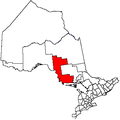Serpent River First Nation
Appearance
(Redirected from Serpent River Ojibwa)
| People | Ojibwe |
|---|---|
| Treaty | Robinson Huron |
| Headquarters | 195 Village Road, Cutler |
| Province | Ontario |
| Land[1] | |
| Main reserve | Serpent River 7 |
| Land area | 108.79 km2 |
| Population (2024)[1] | |
| On reserve | 375 |
| On other land | 27 |
| Off reserve | 1219 |
| Total population | 1621 |
| Government[1] | |
| Chief | Wilma Johnston |
| Council | Shirley Ahwanaquot Kerri Commanda Richard Measwasige Michelle Owl John Trudeau |
| Tribal Council[1] | |
| Anishinabek Nation Mamaweswen, The North Shore Tribal Council | |
| Website | |
| https://serpentriverfn.com/ | |
Serpent River 7 | |
|---|---|
| Serpent River First Nations Reserve No. 7 | |
 | |
| Coordinates: 46°11′N 82°33′W / 46.183°N 82.550°W | |
| Country | |
| Province | |
| District | Algoma |
| First Nation | Serpent River |
| Area | |
| • Land | 79.03 km2 (30.51 sq mi) |
| Population (2011)[2] | |
• Total | 373 |
| • Density | 4.7/km2 (12/sq mi) |
| Website | serpentriverfn.ca |
The Serpent River First Nation (Ojibwe: Genabaajing Anishinaabek),[3] a signatory to the Robinson Huron Treaty of 1850, is an Anishinaabe First Nation in the Canadian province of Ontario, located midway between Sault Ste. Marie and Sudbury along the North Channel of Lake Huron.
The First Nation's provisional territory extends from this waters of the North Channel of Lake Huron, Serpent River Basin; north beyond the city of Elliot Lake.[4] The Serpent River nation has a provisional land base of 5250 square kilometers.[5] It occupies the Serpent River 7 reserve.
The First Nation was impacted significantly by uranium mining at Elliot Lake, including through contamination of the Serpent River.[6]
Notable members
[edit]- Bonnie Devine, conceptual artist, curator, filmmaker, and author[7]
- Jesse Wente, film critic, radio personality, curator
References
[edit]- ^ "Serpent River First Nation - First Nation Detail". Crown-Indigenous Relations and Northern Affairs Canada. Retrieved 19 March 2024.
- ^ a b "Serpent River 7 census profile". 2011 Census of Population. Statistics Canada. 8 February 2012. Retrieved 20 June 2015.
- ^ Serpant River First Nation, Our History, "Serpent River First Nation has a long history starting with the migration from the East Coast in 900AD, to who we are today as Genabaajing in the 21st Century." https://serpentriverfn.com/meetup/our-history/
- ^ "HOME UNION OF ONTARIO INDIANS - Anishinabek Nation".
- ^ "SRFN - Main". Archived from the original on 2010-03-13. Retrieved 2009-11-30.
- ^ Smith, Kelly Anne (2022-04-11). "Serpent River First Nation remains resilient in fight for toxic injustice". Anishinabek News. Retrieved 2023-06-19.
- ^ "Bonnie Devine." Centre for Contemporary Canadian Art. (retrieved 30 Nov 2010)
Further reading
[edit]- Lianne C. Leddy. Serpent River Resurgence: Confronting Uranium Mining at Elliot Lake. Toronto: University of Toronto Press, 2022.
External links
[edit]- Serpent River First Nation Archived 2013-06-15 at the Wayback Machine, official website
- First Nation profile
- Serpent River CBC Profile


